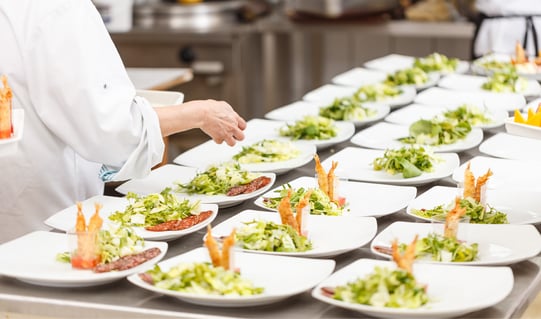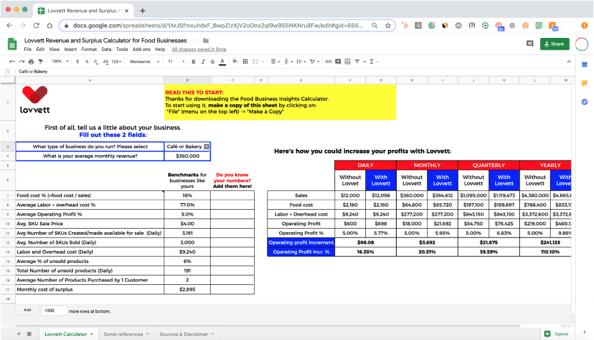
Restaurants are notorious for their contribution to the world's food waste epidemic—in fact, almost half of all food waste can be traced back to restaurants. But as a restauranteur yourself, you ought to know that the status quo isn't your only option. After all, that's how you got so successful in the first place, right?
There are lots of options for restaurants who hope to make use of their surplus food and minimize food waste in one fell swoop. Here are our favorites, and just how they've impacted the restaurant industry from day one.
What is Food Waste, and How Does it Relate to You?
At its core, food waste is any organic matter that's tossed in the garbage or otherwise disposed of. If food is sent somewhere that it cannot be used (whether for recycled meals or compost feed) then chances are it's been wasted.
Food surplus is an inherent part of any food-centric business, and there's no way of getting around it—but that excess doesn't have to become waste. There are plenty of alternative solutions for your surplus bites, and they're not nearly as complicated as you've been led to believe.
Click here to Download the Free Food Business Insights Calculator:
How to Make Use of Surplus Food
Whatever you choose to do with your surplus food, the landfill should always be your last resort. Your extra produce can have a number of fates, and we're divulging some of the best methods for making the planet better, not worse. Let's get right into the nitty gritty.
Donate to Shelters & the Homeless
In a world where food insecurity is a stark reality, using surplus food to feed hungry people seems like a no-brainer. If there were obstacles in the past that kept you from donating your spare calories to those in need, the time has come to hop right over them.
To you restaurant owners, any food bank would be grateful for your regular contribution. Food banks are establishments that send meals to soup kitchens, youth or senior centers, shelters and pantries, among other goodhearted facilities. So long as the products reach quality and safety standards, you're in the clear to deliver the goods.
Food for Thought: Thanks to the Bill Emerson Good Samaritan Food Donation Act, you're not under any legal liability for donated food. So shed that fear and get to giving!
Whether you've got non-perishable items or produce that's still good for eating, donating to those in need is a worthy venture for your restaurant or food business.
Employ a Food Rescue Organization
If you're concerned about the state of food waste, you're not the only one. In fact, there are entire organizations dedicated to distributing meals that didn't make it to the dining room. These plates maintain their flavorful integrity, with premium and high-end ingredients often being a part of the rescued bunch.
Lovvett is a group with eyes for the tastiest leftovers around. Through the act of hooking up merchants and consumers, we're making space for the wise movement of surplus meals. By selling these delicious products at a generous discount of at least 50%, being picked last is gaining a new definition.
Make Friends with a Secondary Reseller
Secondary resellers are retail stores or markets that are dedicated to selling groceries and produce at a discounted price. If you find yourself with excess edibles at your restaurant, doing business with a market like this is beneficial for a few reasons.
-
It's a direct opportunity to help you minimize food waste at your restaurant.
-
These markets give the community a chance to purchase affordable, discounted groceries.
-
You'll save money in the process.
Using a secondary reseller can save your restaurant about $218 per ton of food. One of the biggest names in the business is Grocery Outlet, a company that boasts 225 retail stores. They save their customers billions of dollars a year, and that's not to mention the immense amount of scraps they're saving from the landfill!
Give Farm Animals Something to Munch On
While it may seem like a glum fate for your beloved produce, donating surplus food to farm animals is a quality option. To do so, simply find a local farm in your area that needs assistance, and see if they're open to receiving feed assistance through redirected food waste.
Food for Thought: New Hampshire yogurt experts Stonyfield Farms acquires a ton of leftover yogurt. But according to EPA Archives, they send it straight to the hogs, giving local farm animals something awfully satiating.
If your business uses any kind of animal products, it only makes sense to give back to the farms who give so much to you. And who knows—you may even be able to strike a deal with a farm in your area, giving both parties involved something to chew on for a long time comin'.
Get Creative with Your Preservation
Ever since the advent of refrigeration, food preservation tactics have become a thing of the past But as chefs begin to dig for the why of it all, preserving food in unique ways is becoming a trend of necessity. Also known as value-added processing, preserving food can save your restaurant $2,783 per ton of food (with the potential to divert more than 102,000 tons of food).
One of the most popular methods of preservation is fermentation. A product of nature, fermentation helps build bacteria in a controlled way, whether it be through lactic acid, acetic acid or ethyl alcohol. You can also try your hand at canning, making jams, dehydrating, freeze-drying and more. When it comes to food preservation, your limit really is your imagination.
It's Time to Start Composting
Composting is an effective way to give back to the soil that's granted us so much. By building nutrients in the land, it helps to continue the cycle of growth by contributing to decay. Whether with an at-home compost pile or by way of an industrial composting facility, using the compost instead of the dump is a killer move.
If you're planning on composting your restaurant's high-volume food scraps, an industrial facility is your best bet. Find a local compost center, and be sure to snag a full list of acceptable goods (for example, some facilities don't like limes as it messes with the pH balance of the compost).
Food for Thought: Compost piles actually generate heat, which in turn can be used for energy. You don't have to be as hell-bent on compost energy as Jean Pain, but contributing to the right compost pile can make clean energy a thing of the present.
While you're at this compost thing, switch out your plastic utensils, straws and containers for some compostable ones—just be sure they don't go into the recycling or garbage when your guests are done with them. With this clever maneuver, you're killing two birds with one stone.
Be a Part of the Food Waste Solution
Food surplus is a beautiful thing, but food waste? Not so much. Restaurants have a tendency to throw away food in large quantities, but the reasons for their actions are multifaceted. Some cafes are just too small to be able to participate in meal rescue pickups. Meanwhile, there are chains who are bent on convenience, not realizing that making an effort to conserve edible resources is actually in their financial favor.
At the end of the day, the reason for food waste isn't our greatest concern. Our planet, the people who live among it and everything in between, they need our help— and being a part of the food waste solution is the fast track to a thriving world. We believe in the power of conscious consumption, and with the right solutions in place, no consumer needs to give up on their favorite Sunday brunch spot nor the best late-night dinner in town. Restaurants are here to stay, but the surplus food game is changing for the better, and we're ready and eager to see how it all plays out.
Download the FREE Food Business Insights Calculator and find out how much you can increase your monthly profits by selling your surplus:









.png) by lovvett ® 2020
by lovvett ® 2020